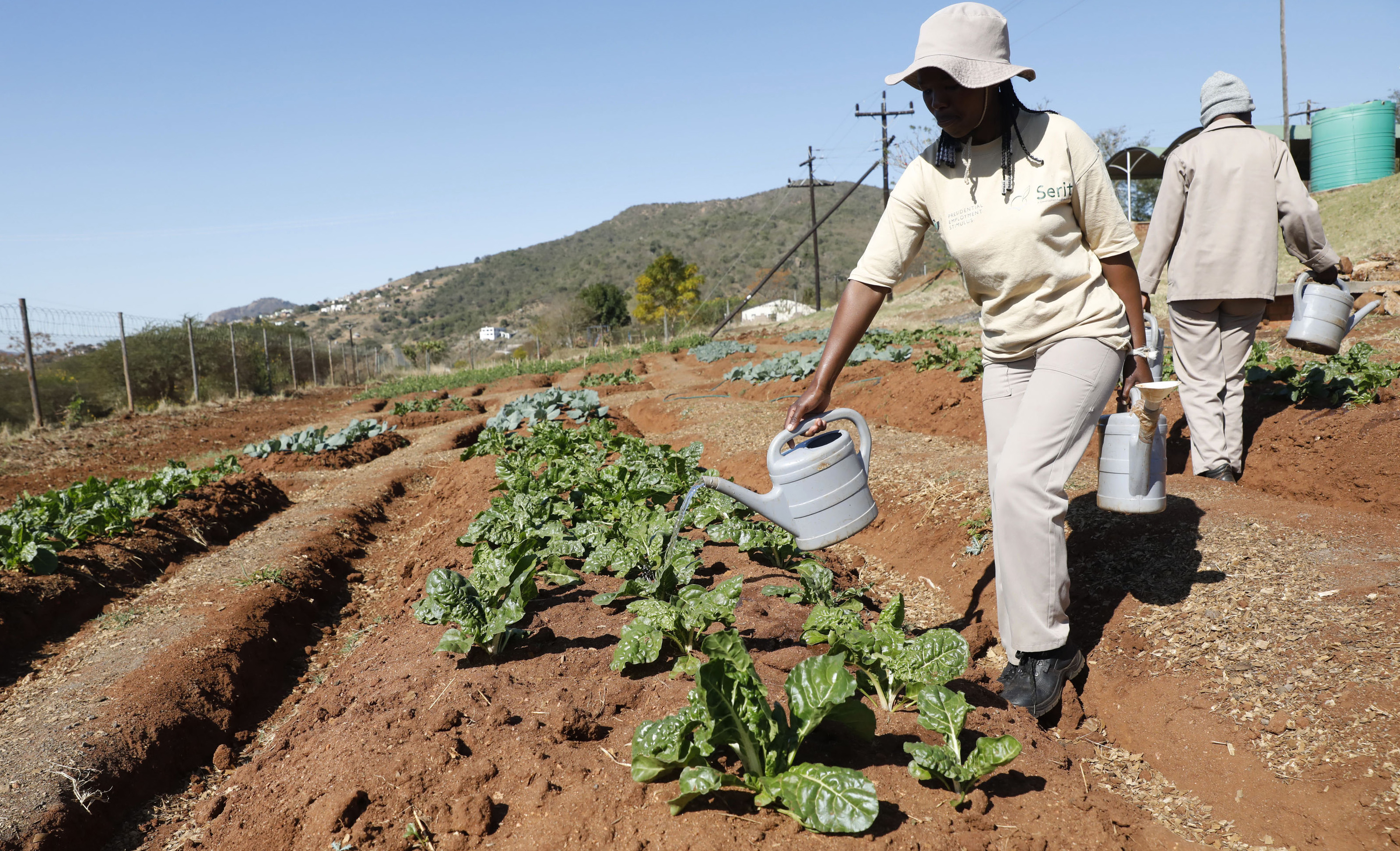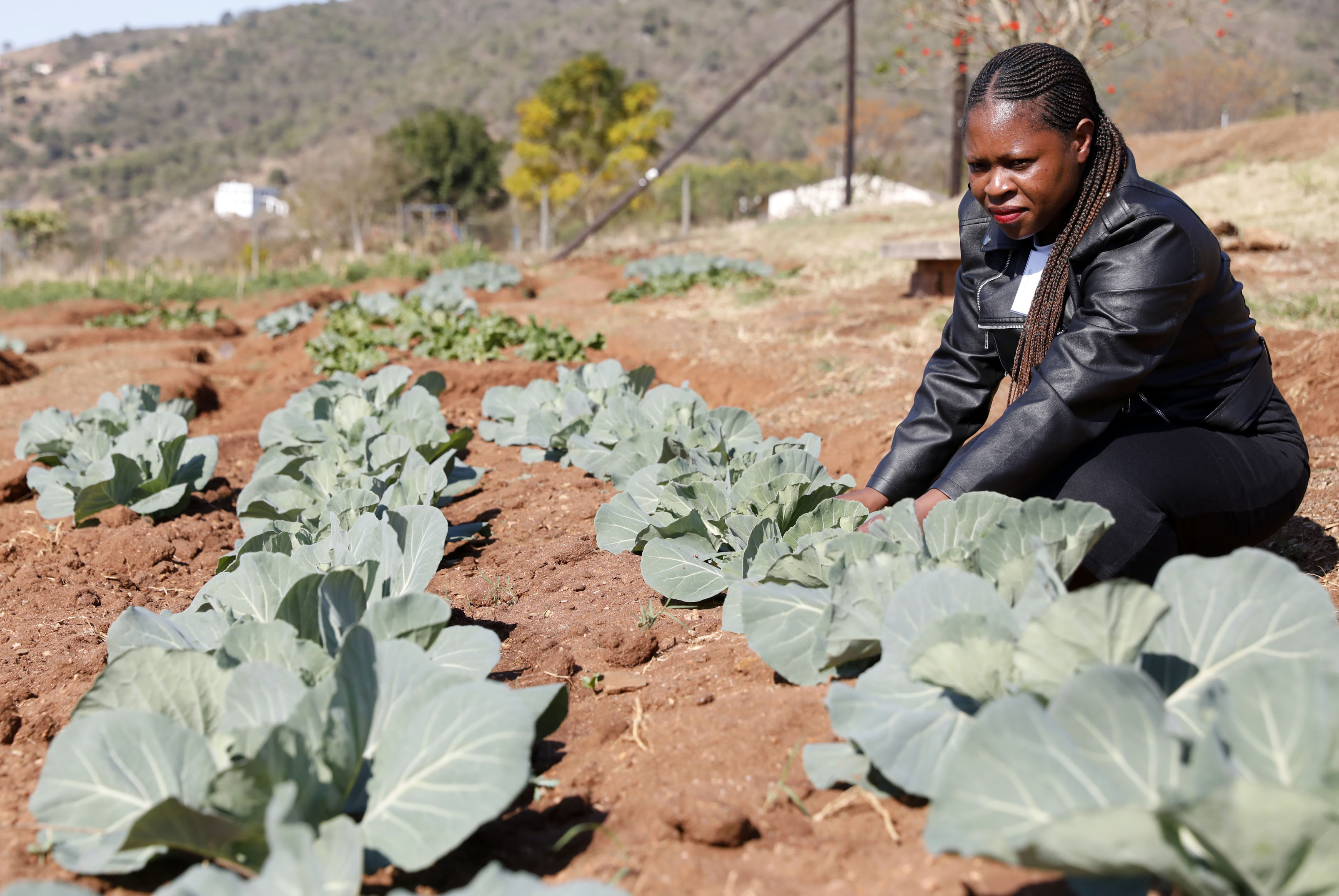It’s the year 2021. Nontobeko Khanyile from KwaXimba village in Inchanga, KwaZulu-Natal, has finally got a break in her small-scale farming career. A local business owner notices and funds her vegetable garden, which she and seven women use to sustain themselves and their families.
He donates R25,000 to help them get tools, seeds and other necessities to grow the small-scale farm. There is a demand for their organic, affordable produce, so they invest most of the money into the startup, hoping for good returns.
Fast-forward to April 2022. KwaZulu-Natal is hit by devastating floods. Khanyile (32) and her partners lose everything they produce — spinach, tomatoes, carrots, cabbages and potatoes.
“We were left with nothing. I was so stressed I could not speak for days, We had potatoes, but they all got washed away along with everything else,” Khanyile said.
 Staff at a small-scale farm in KwaXimba cultivate and maintain crops. (Photo: Mandla Langa)
Staff at a small-scale farm in KwaXimba cultivate and maintain crops. (Photo: Mandla Langa)
Khanyile speaks to Daily Maverick at a hall in KwaXimba that has a small-scale farm, which is one of many she manages. She is a director and founder of the Ezemvelo farming project and is one of the leaders of the movement toward organic farming in the area, in collaboration with multiple organisations.
Despite the strides she has made, she still faces many challenges such as climate change, funding and accessing markets, while advocating for the decentralisation of the food industry and food culture in South Africa.
Constantly adapting
Climate change is expected to substantially reduce future crop yields in South Africa, affecting food security and livelihoods. Farmers are looking for and adopting strategies to mitigate the effect of climate change-induced yield losses.
KwaZulu-Natal is also a drought-prone province that has barely recovered from the 2019 drought. The South African Weather Service stated in its mid-year drought bulletin that the province had experienced “somewhat dry conditions in the first half of the year”.
“We can go a month without water in our taps,” Khanyile said. “It doesn’t rain enough. It can be dry [and] the rain only comes when it’s heavy, it only comes to destroy.”
These erratic weather conditions, paired with extreme hot and cold temperatures, make adapting to the new reality a challenge, but Khanyile says she has learnt methods from organisations such as Woza Nami.
The project, by the Southern Africa Food Lab in partnership with Green Trust and the DG Murray Trust, sets out to improve the potential for good nutrition in communities close to sites established by the eThekwini Municipality agro-ecological hubs programme. There are seven hubs and in Inchanga there’s the 1,000 Hills Hub, which includes a couple of cooperatives and focuses on increasing communities’ access to and consumption of healthy, nutritious food.
“We use the knowledge we got from Woza Nami to dig trenches, design our farms according to the area it is in, what kind of temperatures they will experience, and so forth. To avoid the flooding problem, we use different patterns of planting than we used to. I have had to change the system altogether,” said Khanyile, who studied agriculture at Elangeni TVET College.
Organic best practice
She came into the Woza Nami project through being a Participatory Guarantee Systems SA (PGSSA) Pollinator. The system creates a community that exchanges information during farm visits and can advise on organic best practices.
“I plant organically. I don’t use pesticides, I use home remedies such as boiling onions, garlic and chilli together, and we also use rabbit urine. I believe if you can’t eat it then you shouldn’t use it on your crops.
“We eat unhealthy food these days. Some homes, they don’t cook if there is no oil, but there are traditional dishes such as isigwamba [maize meal and spinach] and isijingi [butternut and maize meal]. You only need water and a spinach or butternut,” Khanyile said.
She says if people go back to traditional ways of producing and preparing food they will be much healthier.
Read more in Daily Maverick: Meet the young new faces of agriculture who are putting food on SA’s tables
 Zamanguni Mncwabe. (Photo: Mandla Langa)
Zamanguni Mncwabe. (Photo: Mandla Langa)
Zamanguni Mncwabe (34) has only recently come into the farming project and gets a stipend from the mining company Seriti. She says the project has changed her life and given her hope.
“I have learnt so much in the three months I have joined. My father has a garden, but I never paid much attention to it. I didn’t know the method of creating beds and setting tomatoes up so they don’t rot. Now the project will add urban farming, using tyres in small spaces,” Mncwabe said.
She was unemployed and now helps to provide for her two children. She says she has been inspired to find ways to develop herself and become an entrepreneur.
Decentralising food systems
The director of the Southern Africa Food Lab, Dr Scott Drimie, specialises in human nutrition and is a partner in Woza Nami.
Drimie says: “The floods demonstrated how we have to build resilient systems — the primary support is through agro-ecological, and how you build the resilience of the ecology [and] soil.
“After the floods, we were able to leverage emergency or relief funds from different organisations, so farms that were damaged could re-establish themselves. We were able to look at irrigation, water catchment, trenches, and other methods that assist in creating resilience.”
He says the challenges smallholder farmers face can be mitigated through constant engagement within the hub. The aim now is to extend the monthly markets into the taxi ranks, libraries and other spaces.
Drimie and Khanyile agree that food systems should be decentralised and handed back to communities. One of the ways Drimie proposes this is the One Home, One Garden programme, an initiative launched by the provincial government to encourage families to take up gardening to fight food insecurity. Drimie said it can help to feed people and allow them to sell produce.
“Markets should become much more than places to buy food … [they should] become a space with social capital. Someone suggested that there could be a local choir singing and other events. This then ensures money is in the communities. These are some of the ways we can create alternatives,” Drimie said.
Khanyile added: “We need to change our diets to have more life to take care of our children. If we do not change it now we might as well pay funeral policies because we will die. So many people are suffering from cancer, from weak bones, and hypertension.
“Most people buy from supermarkets and don’t support small-scale farmers, but some of those oversized cabbages and other things are unhealthy. So support and buy from farmers because most farmers who produce inorganic food don’t eat that food, they eat food from organic farmers like us.”
Drimie added, “We have to put food back where it belongs, at the heart of communities.” DM




 Zamanguni Mncwabe.
(Photo: Mandla Langa)
Zamanguni Mncwabe.
(Photo: Mandla Langa) 